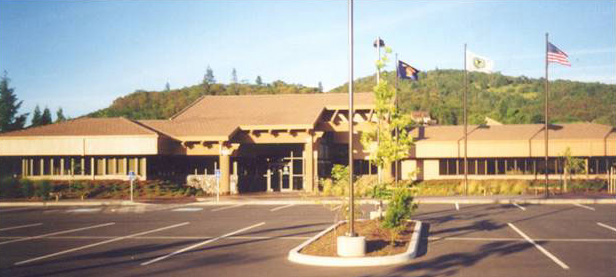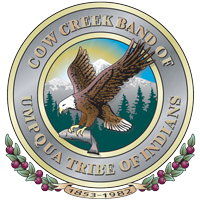Tribal Story
Present
Modern Tribal History
Our Cow Creek ancestors managed to hold on, at the margins of settler society, into the early twentieth century. We occupied marginal land, hunted, fished, trapped, and tended small out-of-the-way gardens. During this time, our people continued to hold Tribal councils just as we had since time immemorial.
 In 1918, our Cow Creek Umpqua Elders formalized our Tribal government and began to lobby for federal services, especially for education services for our children. We also sought justice with the Government for the taking of our land as stipulated in the 1853 Treaty. The $12,000 that we were to have received, but didn’t, equates to the low price of 2.3 cents per acre. At that same time, settlers were paying the Government $1.25 per acre under the Donation Lands Claim Act.
In 1918, our Cow Creek Umpqua Elders formalized our Tribal government and began to lobby for federal services, especially for education services for our children. We also sought justice with the Government for the taking of our land as stipulated in the 1853 Treaty. The $12,000 that we were to have received, but didn’t, equates to the low price of 2.3 cents per acre. At that same time, settlers were paying the Government $1.25 per acre under the Donation Lands Claim Act.
Between 1918 and 1932, five bills were introduced in Congress on behalf of our Cow Creek people. One bill finally passed both the House and Senate in 1932, but was vetoed by President Hoover, who cited that the United States could not afford Indian claims litigation in the midst of the Great Depression. It was a very somber time for our people.
Then on August 13, 1954, Public Law 588, also known as the Western Oregon Indian Termination Act, was passed. This Act was advertised as legislation to “Set the Indians Free” and declared there were no more Indians left in western Oregon, effectively terminating relations with Tribes. The Cow Creek Band of Umpqua Indians was listed as a terminated tribe.
Even after termination, our people continued to seek a land claims case with U.S. Court of Claims. In 1980 the lands claim bill was passed and by 1984 the case was subsequently litigated by the Tribe to a negotiated settlement of $1.5 million in an endowment from which the Tribe draws on an annual basis only the earned interest.
While the claims case proceeded in the court, our people pursued federal recognition and sought to overturn the termination law of 1954. As a result of legislation which passed both houses of Congress by “unanimous consent” on December 29, 1982, a “recognition” law was signed for the Cow Creek Band of Umpqua. The Recognition Act confirmed what our Tribal members already knew for 129 years – that we are a sovereign Tribal government.
Our Tribe never received the reservation our Treaty promised. Even without a reservation, our people remained in their homelands. Today, the Tribe is buying back its land and operating various business enterprises for the economic development of the Cow Creek Tribe and the communities in which we live.
Our Tribal Government Office – located in Roseburg, Oregon – houses our Tribal governing body, known as the Tribal Board of Directors, as well as various Tribal Programs, and one of the Cow Creek Health and Wellness Centers.
The Tribal Board of Directors is responsible for establishing the policies and procedures for the administration of tribal programs, economic development ventures, and other governmental business. The Cow Creek Health and Wellness Centers, which include comprehensive medical staff, is provided for the benefit of not only tribal members and their families, but also for Cow Creek Tribe employees and their families.
The Tribe also has a Gaming Commission that is the regulatory body of the Tribe responsible for compliance with gaming rules and regulations as established by both the Tribal Government and the Tribal/State gaming compact.


